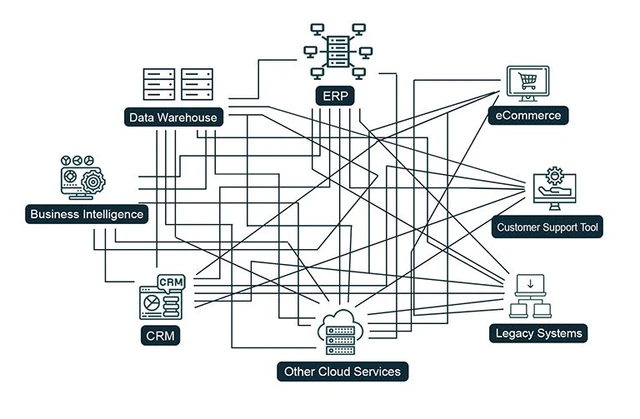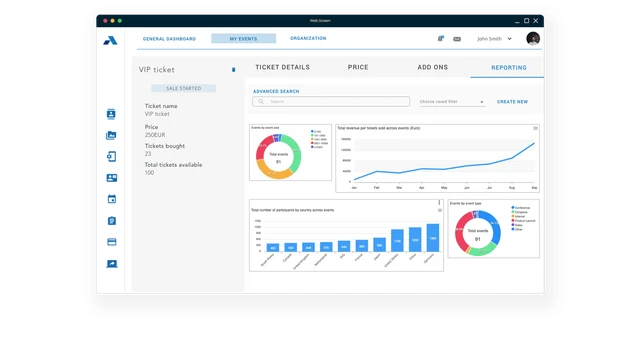Integrating Event Management Software with Enterprise IT Ecosystems
In this blog, we will explore how integrating event management software with existing IT systems like CRM, ERP, and marketing platforms can enhance workflow efficiency, improve data accuracy, and drive overall event success. Learn about the benefits, challenges, best practices, and emerging trends in seamless integration for your business.

In today’s fast-paced business environment, the ability to efficiently manage events is crucial for enterprises aiming to maintain a competitive edge. The integration of event management software with existing enterprise IT ecosystems, such as Customer Relationship Management (CRM) systems, Enterprise Resource Planning (ERP) solutions, and marketing automation platforms, can significantly enhance workflow efficiency, data accuracy, and overall event success. This article delves into the critical aspects of seamless integration, highlighting best practices, potential challenges, and the transformative impact on enterprise operations.
The Importance of Integration in Event Management
Event management is no longer a standalone function but an integral part of an organization's broader operational strategy. Enterprises often juggle multiple IT systems—each handling different aspects of their operations, from customer data and financial transactions to marketing campaigns. Without integration, these systems operate in silos, leading to inefficiencies, data inconsistencies, and missed opportunities. Integrating event management software with these existing IT systems can centralize data, streamline workflows, and provide a unified view of all event-related activities.
Key Benefits of Integration
Streamlined Workflows: Integrating event management software with enterprise IT systems can automate numerous manual processes, significantly reducing the time and effort required to manage events. For example, when an event management platform is connected to a CRM system, attendee information can be automatically updated, eliminating the need for manual data entry. This automation extends to other systems like ERP and marketing automation tools, where tasks such as budgeting, invoicing, and marketing campaign execution can be synchronized with event activities.
Improved Data Accuracy and Consistency: Data accuracy is paramount in event management, where decisions are often based on real-time information. Integration ensures that data is consistently updated across all systems, minimizing the risk of errors. For instance, if a participant's contact details are updated in the CRM, those changes are instantly reflected in the event management software, ensuring that communication remains accurate and up-to-date.
Enhanced Analytics and Reporting: By integrating event management software with other enterprise systems, organizations can leverage advanced analytics to gain deeper insights into their events. This integration allows for the aggregation of data from multiple sources, providing a comprehensive view of an event’s performance. Metrics such as attendee engagement, return on investment (ROI), and operational efficiency can be analyzed more effectively, leading to data-driven decision-making and continuous improvement in event strategies.
Better Customer Experience: A seamless integration enables enterprises to deliver a more personalized and engaging experience for event participants. For instance, data from a CRM system can be used to tailor event communications, while ERP systems can ensure that logistical aspects, such as registration and payment processes, are smooth and hassle-free. The result is an enhanced customer experience that fosters stronger relationships and brand loyalty.
Challenges in Integration and How to Overcome Them
Compatibility Issues: One of the primary challenges in integrating event management software with existing enterprise IT systems is compatibility. Enterprises often use a mix of legacy systems and modern software, which may not always be compatible. To overcome this challenge, organizations should invest in middleware solutions that facilitate communication between disparate systems. Additionally, choosing event management software with robust API capabilities can ensure smoother integration.
Data Security and Privacy Concerns: Integration involves the transfer and sharing of data across different systems, raising concerns about data security and privacy. To mitigate these risks, enterprises should implement strong encryption protocols and access controls to protect sensitive information. Additionally, ensuring compliance with relevant data protection regulations, such as GDPR or CCPA, is essential to avoid legal pitfalls.
Cost and Resource Allocation: Integrating multiple systems can be resource-intensive, both in terms of time and financial investment. Enterprises should conduct a thorough cost-benefit analysis to determine the potential return on investment from integration. It is also advisable to start with a phased approach, integrating systems gradually to manage costs and resources effectively.
User Training and Adoption: Even with seamless integration, the success of any IT initiative depends on user adoption. Employees must be adequately trained to use the integrated systems effectively. Providing comprehensive training sessions, user manuals, and ongoing support can help ease the transition and ensure that employees are comfortable with the new tools.
Best Practices for Successful Integration
1. Conduct a Thorough Needs Assessment: Before embarking on integration, it is crucial to assess the organization's specific needs and goals. This assessment should involve key stakeholders from different departments to ensure that the integration aligns with the overall business strategy. Understanding the unique requirements of each system and how they interact with the event management software will help in designing an integration strategy that maximizes benefits.
2. Choose the Right Integration Tools: Selecting the right tools is vital for successful integration. Enterprises should look for event management software that offers robust integration capabilities, including APIs, webhooks, and middleware support. Additionally, leveraging third-party integration platforms can simplify the process, especially for organizations with complex IT ecosystems.
3. Implement a Phased Integration Approach: Rather than attempting to integrate all systems at once, it is advisable to adopt a phased approach. Start with the most critical systems, such as CRM or ERP, and gradually expand to include other platforms. This method allows organizations to address any issues that arise during the integration process and make adjustments as needed.
4. Ensure Continuous Monitoring and Optimization: Integration is not a one-time task but an ongoing process. Enterprises should continuously monitor the performance of the integrated systems to identify any bottlenecks or areas for improvement. Regular audits and feedback loops can help in refining the integration strategy, ensuring that it remains aligned with the organization's evolving needs.
Case Studies: Successful Integration in Action
To illustrate the benefits of integration, let's consider a few examples of organizations that have successfully integrated their event management software with enterprise IT systems.
1. Global Tech Conference: A leading technology company integrated its event management software with its CRM and marketing automation platforms to streamline the organization of its annual global conference. By synchronizing attendee data and automating marketing campaigns, the company was able to significantly reduce manual workload, enhance attendee engagement, and achieve a higher ROI on its events.
2. Healthcare Symposium: A healthcare organization integrated its event management software with its ERP system to manage the logistics of a large-scale symposium. This integration allowed for real-time tracking of expenses, automated invoicing, and efficient resource allocation. As a result, the organization achieved greater financial control and operational efficiency, ensuring the symposium's success.
3. Corporate Training Events: A multinational corporation integrated its event management software with its learning management system (LMS) and HR software to manage its corporate training events. This integration enabled seamless registration, tracking of employee participation, and automated certification processes. The company experienced improved employee engagement and a more streamlined training process.
Future Trends in Event Management Software Integration: As technology continues to evolve, the integration of event management software with enterprise IT ecosystems will become even more sophisticated. Emerging trends such as artificial intelligence (AI), machine learning, and the Internet of Things (IoT) are expected to play a significant role in shaping the future of event management.
1. AI-Powered Analytics: AI-driven analytics can enhance the integration process by providing predictive insights and automating complex tasks. For example, AI can analyze attendee behavior patterns to optimize event planning and marketing strategies, leading to more successful outcomes.
2. IoT-Enabled Event Experiences: The integration of IoT devices with event management software can revolutionize the way events are managed. From smart badges that track attendee movements to connected devices that monitor environmental conditions, IoT can provide real-time data that enhances both operational efficiency and attendee experience.
3. Blockchain for Secure Transactions: Blockchain technology is poised to transform the security aspect of event management. By integrating blockchain with event management software, organizations can ensure secure and transparent transactions, from ticketing to vendor payments, reducing the risk of fraud and enhancing trust.
Integrating event management software with enterprise IT ecosystems is a strategic move that can yield significant benefits for organizations. From streamlining workflows and improving data accuracy to enhancing customer experiences and enabling advanced analytics, the advantages are clear. However, successful integration requires careful planning, the right tools, and ongoing optimization. By following best practices and staying abreast of emerging trends, enterprises can leverage integration to drive efficiency, innovation, and success in their event management efforts.












